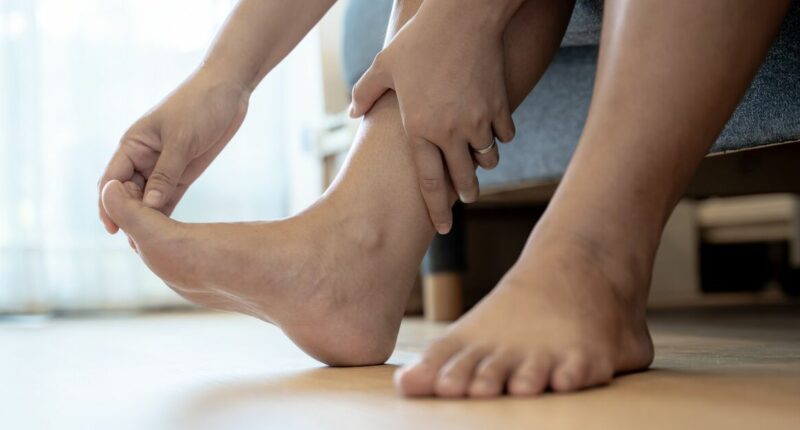Share this @internewscast.com
Healthcare experts recommend seeing a general practitioner if you experience an ongoing and potentially troublesome symptom in your feet. Swelling in the feet could be a sign of various serious health issues, such as heart failure or blood clots.
Occasional swelling in the feet and ankles is not uncommon and can occur after long periods of walking, standing, or exposure to warm weather.
In these cases, resting with your feet elevated is usually sufficient to alleviate the swelling. However, if the swelling continues, it may signal a more serious problem.
According to specialists at Harvard Medical School in the United States, “If swelling lingers, consulting a doctor is advisable as this condition, known as edema, can be a warning sign of more severe underlying issues like heart failure, deep vein thrombosis (a blood clot in a leg vein), kidney disease, or liver cirrhosis. Identifying the root cause of foot and ankle swelling is crucial.”
They further explain, “Standing for extended periods can cause gravity to draw blood into the leg veins, leading to some water from the blood seeping into the leg and foot tissues, resulting in swelling. However, certain medical conditions can also trigger similar swelling due to how they affect fluid movement within the body.”
Deep vein thrombosis
Deep vein thrombosis, often referred to as DVT, is a condition where a blood clot forms in a vein, usually in the leg. These clots can block blood flow from the legs to the heart, causing swelling in the legs and feet.
If not promptly treated, these blood clots can dislodge and travel through the bloodstream to the lungs, leading to a potentially life-threatening pulmonary embolism. Clots can also journey to the heart, causing heart attacks, or to the brain, resulting in strokes.
Harvard Medical School has cautioned: “Usually, the clots occur in only one leg, and so just one leg is unusually swollen. While a new swelling of both legs and feet often is not serious, new swelling of just one leg is always something to bring to your doctor.”
Additional symptoms of DVT include:
- A throbbing pain in one leg when walking or standing
- Warm skin around the affected area
- Red or darkened skin around the painful area – this may be harder to see on darker skin
- Swollen veins that are hard or sore to touch
Find out about the symptoms you need to watch out for and get health advice with our free health newsletter from the Daily Express
Heart failure
Heart failure means that the heart isn’t pumping as effectively as it should. As a result, blood that should be returned to the heart from the leg veins instead accumulates in the veins, causing fluid to leak into the feet and lower legs
Other signs of heart failure to be aware of include:
- Breathlessness
- Fatigue
- Feeling lightheaded and fainting
- A persistent cough, which may be worse at night
- Wheezing
- A bloated tummy
- Loss of appetite
- Weight gain or weight loss
- Confusion
- A fast heart rate
- A pounding, fluttering or irregular heartbeat (palpitations)
Liver disease
Harvard University has stated that certain types of liver disease can result in low blood levels of a protein known as albumin, which is produced in the liver. “Low albumin levels cause fluid in the blood to pass into the tissues, producing swelling not only of the legs and feet, but also other parts of the body such as the hands and face,” it explained.
Other symptoms of liver disease include:
- Feeling very tired and weak all the time
- Loss of appetite – which may lead to weight loss
- Loss of sex drive (libido)
- Yellow skin and whites of the eyes (jaundice)
- Itchy skin
- Feeling or being sick
Kidney disease
Swollen feet can also be a symptom of kidney disease, as fluid can accumulate in the tissues if the kidneys struggle to eliminate excess fluid from the body (one of their primary functions).
Other symptoms of kidney disease can include:
- Weight loss and poor appetite
- Shortness of breath
- Tiredness
- Blood in your urine
- An increased need to pee – particularly at night
- Difficulty sleeping (insomnia)
- Itchy skin
- Muscle cramps
- Feeling sick
- Headaches
- Erectile dysfunction in men
Specialists at Harvard outlined when medical attention should be sought. They said: “Report your symptoms to your doctor if there’s so much swelling that it leaves an indentation if you press your finger into it, or if it has developed suddenly, lasts for more than a few days, affects just one foot, or is accompanied by pain or discolouration of the skin.
“Finally, don’t make your own diagnosis. Sometimes, swelling in the feet is the first clue that you have heart failure or liver or kidney disease, and your doctor needs to consider those possibilities.”
Of course, swollen feet might not always indicate anything severe, but it remains crucial to have them examined, particularly if the condition persists or occurs alongside other symptoms.













